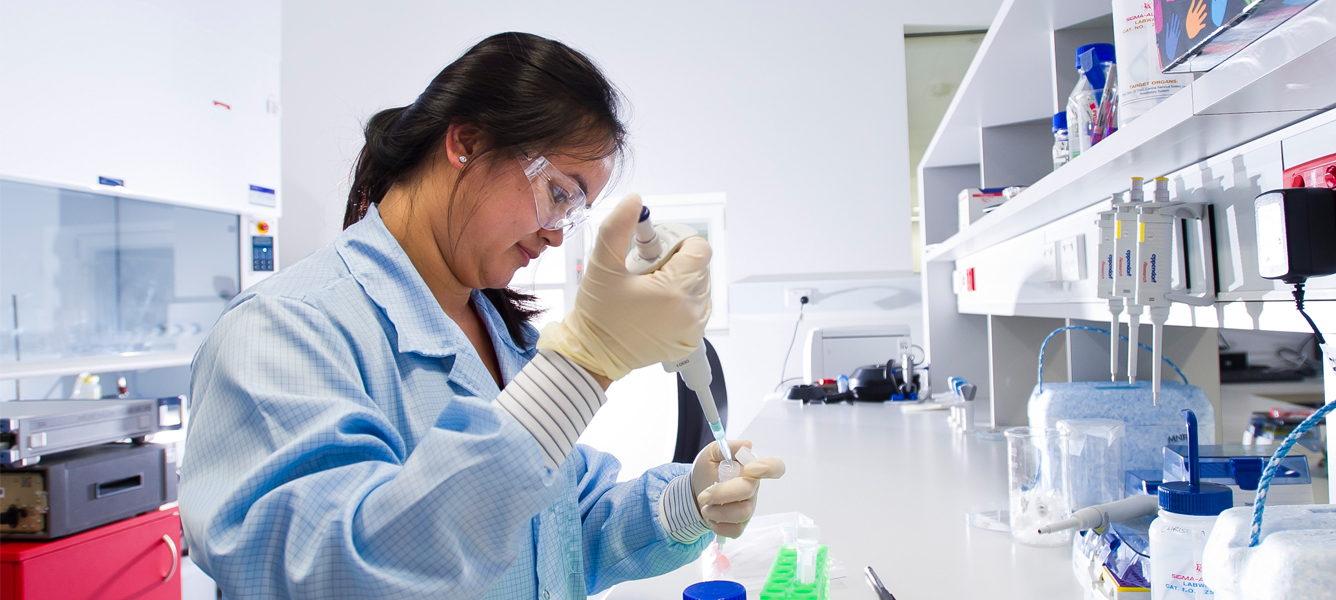Biocapabilities

Complementing a range of microscopy and imaging capabilities, MCN also features a reconfigurable biochemistry laboratory and a PC2 laboratory to provide world-class biocapabiliites that are conveniently located alongside the cleanroom and focused-ion-beam laboratories..
Biochemistry laboratory
The lab:
The reconfigurable laboratory at MCN hosts a wide range of collaborative research activities. These include biological and chemical analysis of fabricated devices, nanoparticle characterisation and imaging.
The equipment:
The lab features standard microscopy capabilities as well as a scanning ion conductance microscope, zeta sizer, microarrayer, UV/VIS spectrophotometer, zeta potential system, UV ozone cleaner and a 3D printer.
The Objet Eden 260V 3D printing system is capable of providing a clean and accurate prototype quickly and easily for a design-to-manufacturing product cycle. The 3D system has an X and Y resolution of 50µm with a Z resolution of 16µm. With a range of polymers available, including a biocompatible MEDGIO resin, researchers can design products with specific polymers to meet their project requirements. Prototypes can be up to 250x250x200mm in size, with an accuracy of 20-85µm for features below 50mm and 200µm for features above 50mm.
PC2 Laboratory
The lab
The Physical Containment Laboratory (PC2) is fully equipped to support research activities involving ‘risk group 2 micro-organisms’ and other rDNA applications exempt from higher classification. The PC2 laboratory houses several collaborative research projects where cell culturing, incubation and maintenance processes are required. It is also used to validate cell proliferation using cell-based assays, and to incorporate fluorescent dyes for viewing cell viability on the laser scanning confocal microscope. Freezer and refrigeration storage facilities are also available.
Equipment
- Biosafety II cabinet
- 95% O2 / 5% CO2 incubator,
- -80oC freezer,
- 4oC fridge,
- Plate reader,
- Fumehood,
- Inverted microscope,
- Centrifuge
- Autoclave
Access
Access to this laboratory is restricted due to the presence of genetically modified organisms (GMOs). Undertaking biosafety II training is mandatory prior to gaining access.
Swinburne Bioengineering Interface Hub
The hub
Partnered with MCN, Swinburne University of Technology provides open-access to its Biointerface Engineering Hub which is focused on modifying the surface of materials and devices to control the behaviour or proteins, bacteria and cells. With expertise in plasma polymerisation, spin coating, self-assembly processes and photolithography, the Hub features a wide range of capabilities that are valuable for applications such as implantable devices as well as biosensing.
Equipment
The hub features a range of instrumentation, including but not limited to:
- Plasma polymerisation with six custom-made reactors, able to etch, treat and deposit surfaces
- Langmuir blodgett surface coatings and analysis
- Multi vessel dip coating can dip up to 10 samples simultaneously and create layer-by-layer coatings from polyelectrolytes
- Dip-pen nanolithography, able to write molecules directly onto surfaces while also integrating with photolithography processes
- Quartz crystal microbalance for the kinetic studies of thin film formation and protein and drug interactions


